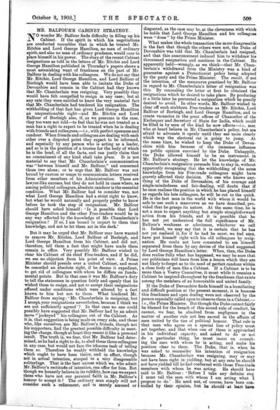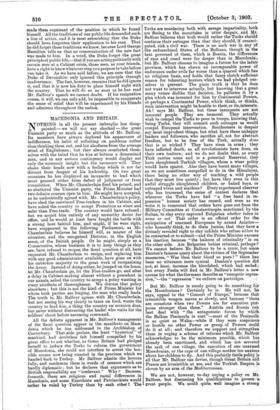MR. BALFOUR'S CABINET STRATEGY.
NO wonder Mr. Balfour finds difficulty in filling up his Cabinet. If the spirit in which his negotiations are conducted resembles that in which he treated Mr. Ritchie and Lord George Hamilton, no man of ordinary spirit, and also no man of ordinary prudence, would care to place himself in his power. The story of the recent Cabinet resignations as told in the letters of Mr. Ritchie and Lord George Hamilton published in Thursday's papers shows a most astonishing want of frankness on the part of Mr. Balfour in dealing with his colleagues. We do not say that Mr. Ritchie, Lord George Hamilton, and Lord Balfour of Burleigh would have been able to imitate the Duke of Devonshire and remain in the Cabinet had they known that Mr. Chamberlain was resigning. Very possibly they would have felt compelled to resign in any ease; but at any rate they were entitled to know the very material fact that Mr. Chamberlain had tendered his resignation. The withholding of that fact has given Lord George Hamilton an unquestionable right—and Mr. Ritchie and Lord Balfour of Burleigh also, if, as we presume is the case, they too were not told—to feel that he was not treated as a man has a right to expect to be treated when he is dealing with friends and colleagues,—i.e., with perfect openness and candour. When friends and colleagues are dealing with each other over a disputed point they expect to be informed, and especially by any person who is acting as a leader, and so is in the position of a trustee for the body of which he is the head, of all the facts, and can justly claim that no concealment of v kind shall take place. It is not material to say that Mr. Chamberlain's communication was "between himself and Mr. Balfour," and concerned those two alone ; or to urn that Mr. Balfour was not bound by custom or usage t',C; communicate letters received from other members of his Administration. These are lawyer-like excuses, but they do not hold in cases where, as among political colleagues, absolute candour is the essential condition. What Mr. Balfour had to consider was, not what Lord George Hamilton had a strict right to know, but what he would naturally and properly prefer to know before he took the step of resignation. Mr. Balfour should have asked himself : Is it possible that Lord George Hamilton and the other Free-traders would be in any way affected by the knowledge of Mr. Chamberlain's resignation ? If so, I am bound to impart to them that knowledge, and not to let them act in the dark.'
But it may be urged that Mr. Balfour may have wanted to remove Mr. Ritchie, Lord Balfour of Burleigh, and Lord George Hamilton from his Cabinet, and did not, therefore, tell them a fact that might have made them remain in office. Very possibly Mr. Balfour wished to clear his Cabinet of its chief Free-traders, and if he did, we see no objection from his point of view. A Prime Minister should preside over a united Cabinet, and must be conceded an absolute right, if he deems it expedient, to get rid of colleagues with whom he differs on funda- mental points. But in that case it was Mr. Balfour's duty to tell the statesmen in question fairly and openly that he wished them to resign, and not to accept their resignations offered under conditions which were altered by a fact known to him but not to them. What hindered Mr. Balfour from Baying: Mr. Chamberlain is resigning, but I accept your resignations nevertheless, because I think we are not sufficiently agreed ' ? In that case no one could possibly have suggested that Mr. Balfour had by an adroit MOVe "jockeyed" his colleagues out of the Cabinet. As it is, that suggestion is being made on every side, and those who, like ourselves, are Mr. Balfour's friends, though not his Supporters, find the greatest possible difficulty in meet- ing the charge, though at heart they resent it like a personal insult. The truth is, we fear, that Mr. Balfour had deter- mined, as he had a right to do, to shed these three colleagues in any case, but would not face the irksome task of telling them so. Therefore he weakly withheld the knowledge which ought to have been theirs, and in effect, though not in actual intention, stooped to a very disagreeable subterfuge. That is the best excuse which we, who admit Mr. Balfour's rectitude of intention, can offer for him. But though we honestly believe in its validity, how can we expect those who have not our personal faith in Mr. Balfour's honour to accept it ? The ordinary man simply will not consider such a refinement, and -is merely amused or disgusted, as the case may be, at the cleverness with which he holds that Lord George Hamilton and his colleagues were " done " by the Prime Minister.
What makes the whole transaction the more disagreeable is the fact that though the others were not, the Duke of Devonshire was told that Mr. Chamberlain had resigned, and that this announcement induced him to withdraw his threatened resignation and continue in the Cabinet. He apparently held—wrongly, as we think—that Mr. Cham- berlain's withdrawal from the Ministry was a. kind of guarantee against a Protectionist policy being adopted by the party and the Prime Minister. The result, if not the intention, of the manceuvre practised by Mr. Balfour in regard to Mr. Chamberlain's letter of resignation was this. By concealing the letter at first he obtained the resignations which he desired to take place. By producing it a little later he prevented a resignation which he greatly desired to avoid. In other words, Mr. Balfour wished to clear off such stubborn Free-traders as Mr. Ritchie, Lord Balfour of Burleigh, and Lord George Hamilton, and to create vacancies in the great offices of Chancellor of the Exchequer and Secretary of State for India, which could be filled in by men of the kind he now affects—i.e., met who at heart believe in Mr. Chamberlain's policy, but are afraid to advocate it openly until they see more clearly which way the electoral cat is going to jump. At the same time, he wished to keep the Duke of Devon- shire with him because of the immense influence on public opinion exercised by the Duke. Unhappily, the Duke allowed himself to be an instrument in Mr. Balfour's strategy. He let the knowledge of Mr. Chamberlain's resignation persuade him to stay in, without apparently recognising that the withholding of the same knowledge from his Free-trade colleagues might have gravely affected their decision. No one who knows any- thing of the Duke of Devonshire, of his courage and single-mindedness and fair-dealing, will doubt that if he once realises the position in which he has placed himself as regards his late colleagues, he will be cut to the quick. He is the last man in the world with whom it would be safe to use such a manoeuvre as we have described, pro- vided that he grasps its nature. At the same time, he is not a man to expect anything but simple straightforward action from his friends, and it is possible that he has not yet understood the full significance of Mr. Balfour's weakness or adroitness, whichever we call it. Indeed, we may say that it is certain that he has not yet realised it, for if he had he must, we feel sdrO, have put himself right with his old colleagues by regig- nation. He could not have consented to see himself separated from them by any device of the kind suggested by Lord George Hamilton's letter. When, then, the Dulls does realise fully what has happened, we may be sure that our politicians will learn from him a lesson which they ate not likely to forget as to the need of perfect candour within a close body of men like a Cabinet. If a Cabinet is to be more than a Vestry Committee, it must while it remains a Cabinet be inspired, throughout by the frankness that exists among the members of an honourable and united family.
If the Duke of Devonshire finds himself in a humiliating and difficult position at the present moment, it is because this frankness and open dealing were not observed by the person especially called upon to observe them in a Cabinet,- i.e., the Prime Minister. But though the Duke cannot fairly be blamed for the breach of this sound rule of conduct, he cannot, we fear, be absolved from negligence in the matter of another rule not less sacred in the affairs of men united by the ties of political honour. That rule is that men who agree on a special lino of policy must act together, and that when one of them is approached in his individual capacity, and asked to do or not do a particular thing, he must insist on consult- ing the men with whom he is acting, and make his position clear to them. The Duke, that is, when he was asked to reconsider his intention of resignation because Mr. Chamberlain was resigning, may or may not have been right in yielding, but at any rate he should not have yielded till he had conferred with those Free-trade members with whom be was acting. He should have said to Mr. Balfour : Before I take any definite ster I must tell the men with whom I am acting what I propose to do.' He need not, of course, have been con- trolled by their opinion, but he should at least have made them cognisant of the position in which he found himself. All the traditions of our public life demanded such a line of action, and it is most astonishing that the Duke should have forgotten their application to his case. That he did forget those traditions we know, because Lord George Hamilton tells us that no communication of the new fact was made to him. In a word, the Duke forgot the great principle of public life,—tbat if you are acting politically with certain men at a Cabinet crisis, those men, as your friends, have a right to know whatever step you propose to take before you take it. As we have said before, we are sure that the Duke of Devonshire only ignored this principle through inadvertence. The fact, however, remains that he did ignore it, and that it is now his duty to place himself right with the country. That he will do so as soon as he has read Mr. Balfour's speech we cannot doubt. If his resignation comes, it will, we can only add, be impossible to exaggerate the sense of relief that will be experienced by his friends and admirers throughout the nation.



























































 Previous page
Previous page